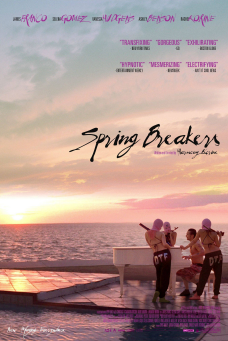Print Edition: April 10, 2013
 For some reason, Spring Breakers has accrued a reputation for wildly divergent reactions based on one’s familiarity with the work of Harmony Korine and the level of accessibility he’s associated with. Those drawn because of names (Selena Gomez! James Franco! Vanessa Hudgens!) will be disappointed. Those expecting spring break forever will end up shaken.
For some reason, Spring Breakers has accrued a reputation for wildly divergent reactions based on one’s familiarity with the work of Harmony Korine and the level of accessibility he’s associated with. Those drawn because of names (Selena Gomez! James Franco! Vanessa Hudgens!) will be disappointed. Those expecting spring break forever will end up shaken.
The entire idea of a film being some degree of accessible as a certain label is hardly worth taking seriously. Whether observing fantasy or life, any viewer should be able to “access” exactly what’s on the screen – there is no sudden barrier because of elliptical editing or unexpected divergences in plot. But there is a difference in period in life in seeing something – whether someone has matured beyond the point of caring about initial highs and lows of party culture and material aspirations or is someone who can’t yet know their beginning and likely end.
Spring Breakers isn’t a movie to only shock, or even stick a knife in the side of an idealized escape, but a movie that is of periods, morphing between what is carefree and caring. Whatever the impression from reactions may be, Korine’s film strongly suggests a caring about the people turned caricature of a distanced-by-nature culture, and a sadness left by the irreparable trustless violence of the weeks and months that add up to “we have to get out of here” and “I don’t want to end up like them” without any idea what “here” and “they” are.
Korine sets up an easy way in – for Spring Breakers’ main group of four, there is a division between those who it is possible to set the early scene with ignored civil rights lectures in favour of oral sex on spring break illustrations (Ashley Benson, Vanessa Hudgens) and an innocent in voiceover like a modern voice-to-text Linda Manz (Selena Gomez). They are the fashions of neon multi-hundred-dollar shoes and bikinis and the ethos of die young, live forever.
They reveal themselves through language. A sentence worth saying is in infinitives and now-normative hyperbole. Everything is a joke (except not everything). They know how to project as many emotions as they know. When the voiceover is a call home, it’s not innocent, (or at least it doesn’t want to be,) and knows how to posture to make the idea of innocence impossible (until it is no longer posturing). And Korine cuts between this and its celebration on the beach and in hotel rooms and its ramifications after the high and between the surges and drops of period-appropriate Skrillex. It is here the allegation might come that Korine is applying too forcefully a moral sense. To cut between spring break and a spiral of violence is manipulative in a fraudulent, not artistic way, and has nothing worth listening to.
But there is no physical violence for more than half of Spring Breakers. This turn is not there to feel offended by for most of the movie. Skrillex’s contributions to the soundtrack have low key moments too, merging with Clint Martinez in a comedown way, but what is most apt and fits with the way Spring Breakers lets go, is in the violence in thoughtless action, or action that actively forgets (“just act like it’s a movie” – and she means an escapist one), the careless threats of inexact language married to free moods, and the appropriation of music, materials, anything across any lines so long as it comes to me. Acquisition, value, pleasure, money, art and possession interlocked – “this is my shit.” This is not an argument for maturity, but a carefully observed depiction of a definition. Korine does not detach, but surrounds, replays, submerges in the—whatever it is—of an obsessive search for happiness – “I feel like I’m finally who I was supposed to be.” To be above a line like that is to laugh at it, but to be the one saying it is to believe it and understand—so thought—every single word and its meaning.
“Perfect” would have to be the dominant word besides variations on “fuck” in Spring Breakers. Vacation, escape, this friendship, that experience, that experiment, was, is perfect. A film is the medium for taking moments, recreating them, making them last forever. Korine’s swaying, re-reeling images and sounds count parties and the moments that need to be preserved and continued among their captured.
But Spring Breakers is not that way – even in the opening drink-splashed nudity there is the knowledge this can only last a matter of minutes—seconds—and something else is going to happen, through movement, cutting, and it will be different.
In Spring Breakers, every act takes place in a time – late capitalism and its privileges, the moment right before pre-meditated knowledge crumbles, a scan of success immediately dated. Even denial only lasts so long. What keeps revolving is the bass, humming and waiting, of music unmade, and gunshots on the soundtrack – punctuation that barely changes, yet keeps its presence, undiminished by recurrence.

